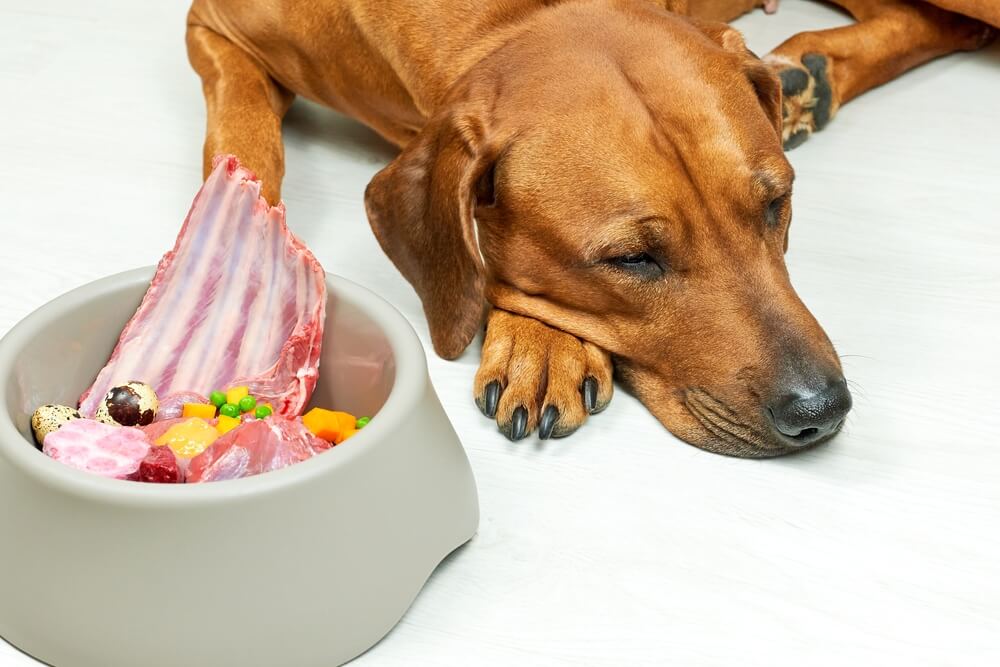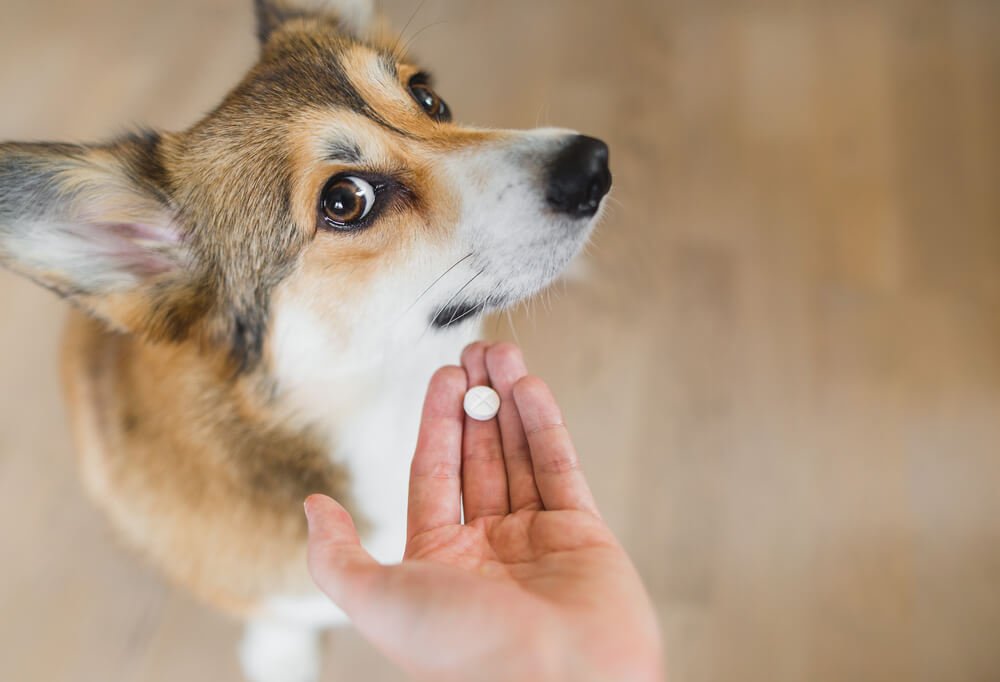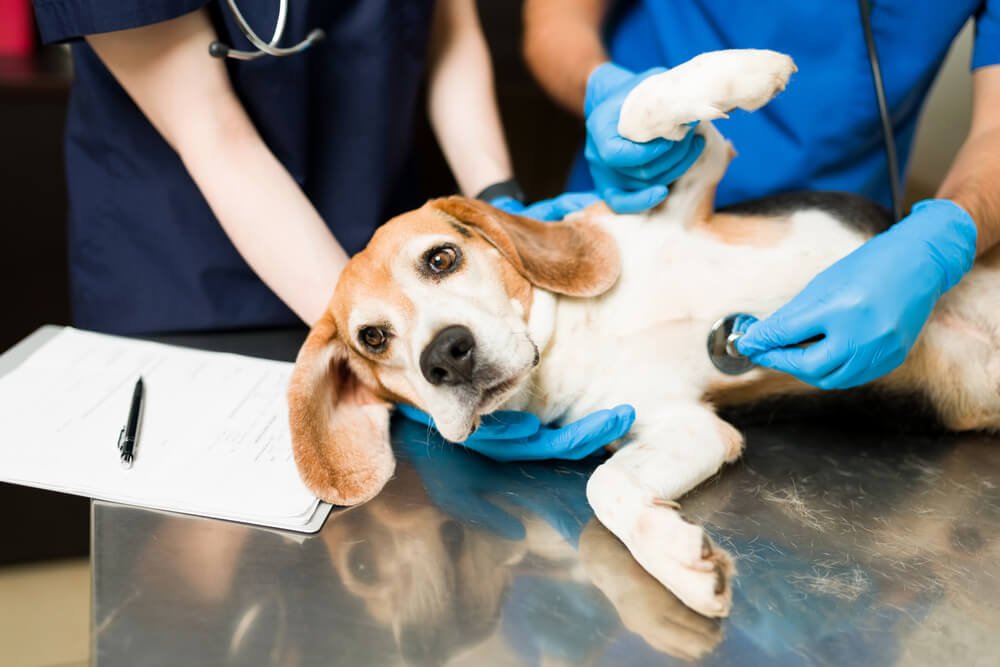
What is gastroenteritis in dogs?
Gastroenteritis is the term given to inflammation of the stomach and intestines which are part of the gastrointestinal tract. It usually results in diarrhea and often vomiting as well. If there is blood in the diarrhea or vomit, then it might be termed hemorrhagic gastroenteritis. Gastroenteritis in dogs is a very common condition and will usually clear up within a few days but sometimes it can become much more serious. It is important to know what signs to look out for and when you should seek veterinary advice.
What are the symptoms of gastroenteritis in dogs?
The symptoms of gastroenteritis can vary from dog to dog but almost always includes diarrhea. This is often accompanied by vomiting. Diarrhea may be explosive, sudden, and watery, or there may be more frequent bowel movements or soft stools. Sometimes blood can be seen in the feces. Other symptoms include:
- Nausea
- Excessive drooling or frequent lip licking and swallowing
- Abdominal discomfort
- A gassy or gurgly stomach
- Restlessness
- Lethargy
- Inappetence
A dog with gastroenteritis might show any number of these signs depending on the severity of the illness. Gastroenteritis should not be confused with gastritis, since the first one refers to the the inflammation of stomach and intestines and the latter to the inflammation of the stomach lining.
What causes gastroenteritis in dogs?

Most common causes include dietary indiscretion, intestinal parasites such as roundworm, or giardia and bacterial infections such as salmonella, campylobacter, or E. coli.
There are a large number of potential causes of gastroenteritis in dogs. It can be caused by anything that upsets the balance of the normal microorganisms (such as bacteria and protozoa) within a dog’s intestinal tract – known as the microbiome. Humans also have a microbiome and in simplistic terms, you may have heard it referred to as ‘good bacteria’ of the gut. Things that can cause an alteration in a dog’s microbiome include:
- Dietary indiscretion – when a dog eats things he shouldn’t, such as rotten food, non-food items, or certain human foods that are not designed for dogs.
- Intestinal parasites – such as roundworm, or giardia
- Viruses – such as parvovirus or rotavirus
- Bacterial infections – such as salmonella, campylobacter, or E. coli
- Food allergies or sensitivities
- Intestinal obstruction – usually caused by a dog eating a non-food object such as a toy or sock
- Toxin ingestion – such as a poisonous plant or chemical
- Cancers of the gastrointestinal tract
- Other underlying illnesses – such as liver disease
Often, the cause is unknown, especially when the condition clears up quickly on its own without the need for further tests.
How is gastroenteritis in dogs diagnosed?
Gastroenteritis is often diagnosed on the symptoms alone, especially if they have been sudden in onset and there is a suspected cause of your dog’s upset stomach. Your veterinarian will ask you some questions about your dog’s history including whether or not they have eaten anything out of the ordinary recently.
If your veterinarian is worried about your dog’s vital signs, or that he has an underlying illness, they might suggest further tests such as blood tests, urinalysis, an ultrasound scan, or an x-ray. If your dog has diarrhea that isn’t resolving or keeps returning, your veterinarian might suggest sending a stool sample to the laboratory to look for an underlying cause.
What is the treatment for gastroenteritis in dogs?

Probiotics and prebiotics can be given to help restore the balance of the microbiome and help to improve symptoms such as diarrhea.
The main initial treatment for gastroenteritis in dogs is usually supportive. The type and level of treatment your dog will require depends on how sick he is. If he is still bright, eating well, and his symptoms only recently started, your veterinarian might suggest treatment at home for your dog, especially if his symptoms are only mild.
If your dog is vomiting, your veterinarian might give him an anti-emetic (anti-sickness) injection which can help to prevent nausea as well as vomiting. Probiotics (beneficial bacteria) and prebiotics (food for the beneficial bacteria) can also be given to help restore the balance of the microbiome and therefore help to improve symptoms such as diarrhea.
Dogs with severe gastroenteritis can quickly become dehydrated and this can be very serious. You can check to see whether your dog is dehydrated by gently picking up the skin on the back of his neck and then letting go. It should spring quickly back into place but if it sinks back down more slowly, then your dog is probably dehydrated. Dogs that are dehydrated often also have tacky, dry gums.
If your veterinarian is concerned that your dog is dehydrated, they might suggest admitting him to the hospital so that he can receive intravenous fluids (a drip). This can also help to replace essential electrolytes that might have been lost through vomit and poop.
Other medicines such as gastro-protectants might be administered to help prevent stomach ulcers. Analgesic (pain-relief) medications are often given to reduce any discomfort. Antibiotics might be given if the symptoms are severe or if tests indicate that there is a bacterial infection.
The role of diet in gastroenteritis
Your dog’s food plays a key role in both the prevention and treatment of gastroenteritis. For dogs suffering from gastroenteritis, the best thing you can do at home is to feed your dog small, frequent meals of highly digestible bland diet. Dogs with food sensitivities can suffer from regular bouts of gastroenteritis. It can often help to feed limited ingredient dog food to make it easier to eliminate any food ingredients that might be contributing to recurrent gastroenteritis and help prevent future episodes. Low carbohydrate diets can also help because carbohydrates are converted into glucose, which in high levels can contribute to inflammation.
What is the prognosis for gastroenteritis in dogs?

If left untreated, gastroenteritis can worsen and cause severe dehydration which can be life-threatening, which is why it’s important to take your pup’s symptoms seriously.
Most cases of gastroenteritis resolve with supportive care, either at home in very mild cases or in the hospital in more serious cases. Recovery time usually is within a few days but sometimes can last a week or more. If left untreated, gastroenteritis can worsen and cause severe dehydration which can be life-threatening. Occasionally, gastroenteritis may be a result of a more serious health condition and can sometimes be fatal, even with veterinary treatment. Thankfully, this is rare and the vast majority of dogs recover from gastroenteritis with no long-lasting effects.
Frequently Asked Questions
How long does dog gastroenteritis last?
Gastroenteritis in dogs usually gets better after a few days. If your dog is severely unwell then the symptoms can last much longer. The sooner gastroenteritis is treated, the quicker your dog is likely to recover.
How do dogs catch gastroenteritis?
Gastroenteritis often isn’t contagious but dogs can sometimes catch gastroenteritis from other dogs. This can happen either through direct contact, or contact with an infected dog’s saliva, vomit, or feces.
How serious is gastroenteritis in dogs?
Most cases of gastroenteritis are not serious and get better quickly once they are treated. However, gastroenteritis can lead to dehydration, especially if it is left untreated, and this can be life-threatening.
Can you treat gastroenteritis in dogs at home?
If your dog has just started having diarrhea or vomiting then you can try and treat it yourself at home by feeding small, frequent meals of highly digestible bland diet. If the symptoms do not improve after 24 hours, or if your dog becomes unwell in himself, then you should take your dog to the veterinarian.


